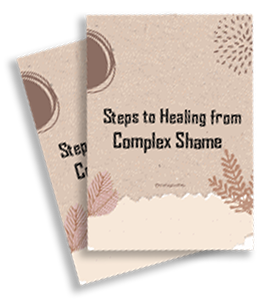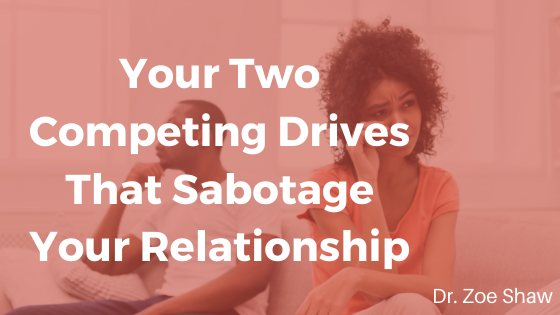Did you know that when you are interacting in your relationships, you have two competing internal parts that influence your interactions? It’s often why relationships feel so complicated. And to further muddle things up, your partner also has two competing parts that you are communicating with.
These competing parts are the drive to connect and the drive to protect. It’s why you sometimes feel conflicted in relationships.
Despite what you may think, our brains were not wired to be productive and happy, successful or achieving the things you want in your life. Our brains were wired first for survival.
Our limbic system is the instinctive part of our brain. It reacts to keeps us alive. The amygdala, is part of our limbic system, but it houses our emotional brain that we feel with and experience pleasure. It is wired for emotional responses, which can sometimes lead toward connection. These two drives, protection and connection are constantly competing.
Often, the drive for survival is predominant if there is any strife or discomfort in your relationship. When things are feeling pretty perfect and going smoothly, your limbic system calms down and your drive for connection steers the boat.
You would think that our brain would want us to be happy. And to a certain extent, it does, but that is not its main goal. That would be nice, but more important than being happy is being alive when it comes to the continuation of our species.
So, we are constantly competing with ourselves and others because of these two drives as you seek to have a better relationship with yourself and your partner.
I want you to look at your competing parts:
1. The drive to connect is easily expressed when you sense that your partner is a reliable, understanding, loving person who is committed to the relationship. It’s easy to be warm, move towards them, share your desires, connect. There is an ease there.
But if you worry that your partner is not completely trustworthy with your emotions, your drive to protect gets triggered. Think about if you are walking in a dark area and you’ve been told it’s dangerous to walk in the dark- you hear a noise behind you and you’re probably going to turn, look all around and be more watchful as you walk down the street. Every sound feels like a threat. If you were walking during the day and heard sounds, you may not even think twice about it. This is what happens when your limbic system gets triggered in relationships. You are on the lookout and everything looks like potential proof that your partner doesn’t care about you or he’s dangerous in some way. You are in danger of being rejected or hurt.
Some people have a stronger drive to protect given their early history and wiring that has taught the brain that the world and people aren’t safe. If you notice that you often think these types of thoughts- are on the lookout for feel danger everywhere and feel distrustful, then you probably have a stronger drive to protect.
2. Drive to protect shows up as shutting down emotionally, communicating with sarcasm, irritability or defensiveness.
You may constantly feel suspicious, give the silent treatment or distance yourself from your partner when what you really want is to be close to them. You may find fault in your partner or act rude, highlight their faults and mistakes. You’re fearful of being vulnerable.
Or you may notice your partner is doing this to you often. He’s responding from a protective mechanism that is undermining your relationship.
Gaining space from your partner may make you feel temporarily safer, but you are actually damaging your relationship.
Self-protection is an ironic thing because it paradoxically ends up creating the very thing we don’t want. Less intimacy and less security. It’s like trying to walk toward something by walking away from it. It doesn’t work.
The question isn’t whether offenses will come into your relationship. They will. The question is what do you do with offenses. What do you do when you’re hurt?
Sometimes, you’re not even getting hurt by what’s said. Unmet expectations are the breeding grounds for feeling offended. The more intimate relationship, the higher the potential for offense.
It’s not that he said he doesn’t care about you, but he forgot to kiss you goodbye when he always does. He didn’t make a big deal about your birthday or he blew you off when you were venting to him about your difficult day at work. You want to put up an emotional barrier to prevent you from being wounded.
You decide I’m not apologizing first, I apologized last time. I’m not going to say anything, I’m going to hold onto that for protection. I may be able to use it in the future. I wish I could give him a hug, but I’m not. I need to teach him a lesson. I need to….. protect myself.
So, what can you do? How do you stop your competing desire for protection from sabotaging your relationship?
1. First, when things get heated or emotional, ask yourself am I responding from a place of protection or connection?
If it’s protection, which you may recognize as your default, how do you move towards connection?
Conventional faith-based advice may be to turn the other cheek, just love your husband through this, don’t hold onto offenses, just lay them at the feet of God and love your husband anyway, showing up joyful and giving and open.
I think we should lay everything at the feet of God, but otherwise, this advice works wonders only if you have a mature, reciprocal relationship, but what if you don’t? Is it really healthy for you, your husband or the marriage to allow yourself to be slighted time and again? For your needs to not matter in a relationship? No, we are not called to this. We must be discerning about the dynamics that are going on and there must be a balance. The good news is that those two competing parts of your brain can dance together in the healthiest of ways.
2. Ask yourself, what do I need to protect myself from? Does this have a valid foundation? Has your husband repeatedly acted in such a way on this issue that has lead you to distrust him?
If your answer is yes, then you are not being unnecessarily defensive. Your emotional reaction is valid and necessarily protective. BUT, that doesn’t mean you’re free to give all the silent treatment you want to give. It doesn’t mean it’s time to distance yourself. No, remember, even with a valid reason, this kind of behavior hurts the relationship.
3. You can protect yourself by erecting healthy boundaries, being clear what behavioral you will and won’t tolerate, yet still being open and communicative.
You are not distancing, but rather acknowledging your brain’s desire to protect you, recognizing that your relationship issues do not equal danger and instead, walking through the fear and voicing all of your issues to your husband.
4. It’s helpful to remind yourself that you are both on the same team.
He is not the enemy. Focus on his efforts and try to see him through a lens of trust, not suspicion.
5. Listen to his point of view with an open mind and look for the grain of truth.
Express how you feel clearly without using hedging words. Hedging words, negate what you just said, like, “ I think, maybe, is that okay, kind of,”. Don’t do that. Speak clearly and definitely.
Don’t interrupt. Interrupting is protective, not connective.
Often, we are just reacting, without consciously thinking of our reactions or the motivations for them. Now, that you are aware, you can protect yourself if necessary and connect at the same time.
It may be difficult to move away from protective behavior in your relationships, but with conscious intention you can succeed in making a space for truth and honesty that needs no cloak of protection. You’ve got this!!

Subscribe and Heal your Relationships.
You deserve a healthy, loving relationship and it starts with You. Learn how to untangle
Complex Shame™ and co-dependency to finally have the beautiful, secure relationship with
yourself and others that you’ve always wanted.
Subscribe and as a thank you, I’ll send you the Steps to Healing from Complex
Shame™.













